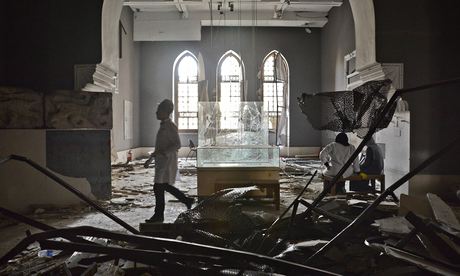
The Egyptian Islamic Arts Museum building in Cairo was attacked this year. Photograph: Anadolu Agency/Getty Images
Washington says helicopters are to help quell militancy in Sinai desert and should not be seen as US giving its blessing to Egypt's political process
The US has given the go-ahead for the delivery of 10 Apache helicopters to Egypt that the Obama administration had withheld since the military-led overthrow of Mohamed Morsi last year.
A spokesman for the US defence department said the helicopters would be sent to help Egypt quell a wave of militancy in the country's northern Sinai desert, where Islamist extremists have been fighting a cat-and-mouse insurgency since Morsi's overthrow last July, and have since made a series of bomb attacks on the Egyptian mainland.
Hundreds of police and soldiers have been killed in the attacks. In turn, Egypt's security officials have been criticised for its scorched-earth counterinsurgency tactics that have seen innocent Sinai residents killed, and their homes destroyed.
The Apaches' delivery will please Egyptian military officials who had previously claimed in private that the withholding of the helicopters was in effect siding with the government's opponents. But it will further anger Morsi's supporters, who feel the US has always given tacit approval to the ex-president's overthrow.
Pentagon spokesman John Kirby said the delivery simply recognised Egypt's commitment to its 1979 peace treaty with Israel, the terms of which dictate that the US supply Egypt with annual deliveries of military aid. But he cautioned that the move should not be seen as a blessing of Egypt's political process.
"We are not yet able to certify that Egypt is taking steps to support a democratic transition," said Kirby in a statement that urged "the Egyptian government to demonstrate progress on a more inclusive transition that respects the human rights and fundamental freedoms of all Egyptians".
US state department spokeswoman Jen Psaki issued a similar statement, calling on Egypt to ensure a smooth transition to democracy – "as Egypt will be more secure and prosperous if it respects the universal rights of its citizens".
Since Morsi's overthrow last year, following days of mass protests, Egypt's authorities have arrested more than 16,000 dissidents, and killed thousands. The crackdown first targeted Morsi's Islamist supporters, but has since enveloped any kind of opposition – including secular activists and journalists.
Egyptians will elect a new president next month in Egypt's first election since Morsi's overthrow – but several prominent candidates have dropped out, citing a lack of free speech. One, the moderate Islamist Abdel Moneim Aboul Fotouh, highlighted the impossibility of campaigning in an environment where political opposition has often been equated to terrorism.

No comments:
Post a Comment